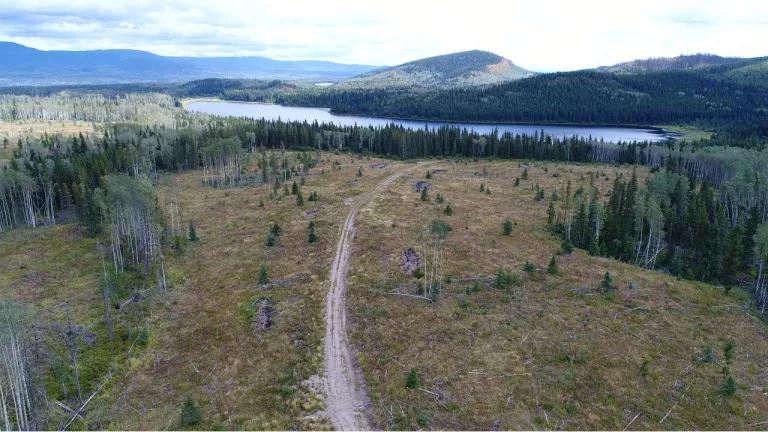The U.K. Is Burning Canadian Forests for Fuel
Twenty-three environmental organizations stress that the U.K. government funding the incineration of imported Canadian wood pellets threatens climate progress.

Clearcut in Canada
River Jordan for NRDC
Influential environmental groups from across Canada wrote to the United Kingdom government today, urging it to stop incentivizing the mass burning of wood pellets from clearcut forests in Canada and falsely characterizing it as clean energy. The new letter responds to a proposed U.K. policy that would indefinitely subsidize the forest-based biomass industry with up to billions of pounds based on the disproven, widely-condemned position that burning imported forest pellets in industrial-scale power plants is a climate solution. The U.K.’s ever-growing dependence on forest biomass is helping to fuel the industrial logging of Canadian primary (never before industrially logged) forests. Canada ranks third globally for both wood pellet exports and its rate of diminishing intact forest landscapes. Industrial logging across Canada is releasing climate-disrupting emissions and clearing threatened species habitat. The U.K. characterizing mass volumes of imported Canadian biomass as sustainable, therefore, is a reckless stance which greenwashes these damaging operations.
The letter was sent the same day that the BBC and environmental experts revealed new evidence suggesting that the energy company Drax – the world’s largest corporate consumer of wood pellets and a key recipient of U.K. biomass subsidies – has been relying in part on wood from threatened old-growth forests in Canada.
In Canada, companies both log trees specifically for pellet production, and create pellets as a coproduct along with other forest products including toilet paper, tissue, and lumber. This makes wood pellet production one of the drivers of half a million logged hectares across Canada each year, which degrades these forests and releases large volumes of CO2. In the U.K, Drax’s wood burning power plant is estimated as the largest single CO2 emitter in the country’s power sector. U.K. taxpayers have already been required to subsidize the biomass industry with billions of pounds based on the unfounded premise – maintained by both the U.K. and Canadian governments– that clearcutting forests is carbon neutral. Yet scientists and environmental experts have highlighted that logging and burning forest biomass releases CO2 emissions on par with fossil fuels, and that industrial logging degrades species-protecting, carbon-storing forests. In short, the evidence overwhelmingly indicates that large-scale production and incineration of forest biomass is fueling – not fixing – the climate crisis.
There are several key ways that the logging, exporting, and burning of Canadian trees as biomass threatens the climate. First, scientific evidence — corroborated by the Government of Canada — has shown that the burning of forest biomass in power plants releases more greenhouse gas emissions than fossil fuels over the timeline that scientists say humanity needs to rapidly scale down emissions. While industry often claims that forest biomass’ CO2 emissions will recover thanks to replanting efforts following logging, scientists estimate that the “carbon debt” of this logging can take hundreds of years to repay. This is time we don’t have: The world’s leading climate change experts stress that we need to reduce emissions immediately to avoid catastrophic climate breakdown. Second, industrial logging operations disturb carbon-storing soils and vegetation and release large volumes of CO2 emissions. Even were the biomass industry to somehow figure out how to implement (expensive, unproven) large-scale “carbon capture” technology, logging-related emissions occur long before pellets reach the power plants where this technology would be installed. Third, by gambling away limited U.K. subsidies on biomass, the government is diverting funds from cleaner forms of energy like wind and solar, at a time when experts say those energy sources could fully power the U.K. within decades if given the right government support. Instead, the U.K. importing biomass from Canada degrades forests, releases emissions, and stymies a clean energy transition for the indefinite future.
Today's letter urges the U.K. to stop subsidizing the forest biomass industry, and instead to advance low energy carbon energy solutions that actually address the climate crisis. The U.K. has publicly committed to rapidly lowering its climate emissions and protecting global forests. As a first critical step to meet these commitments, it will need to stop falsely treating the burning of forests in power plants as progress. Experts on Canadian forests have stressed that biomass threatens primary forests, species, and the global climate. Will the U.K. government take heed, and stop wasting taxpayer pounds on this false promise?
This blog was edited on March 5, 2024.



